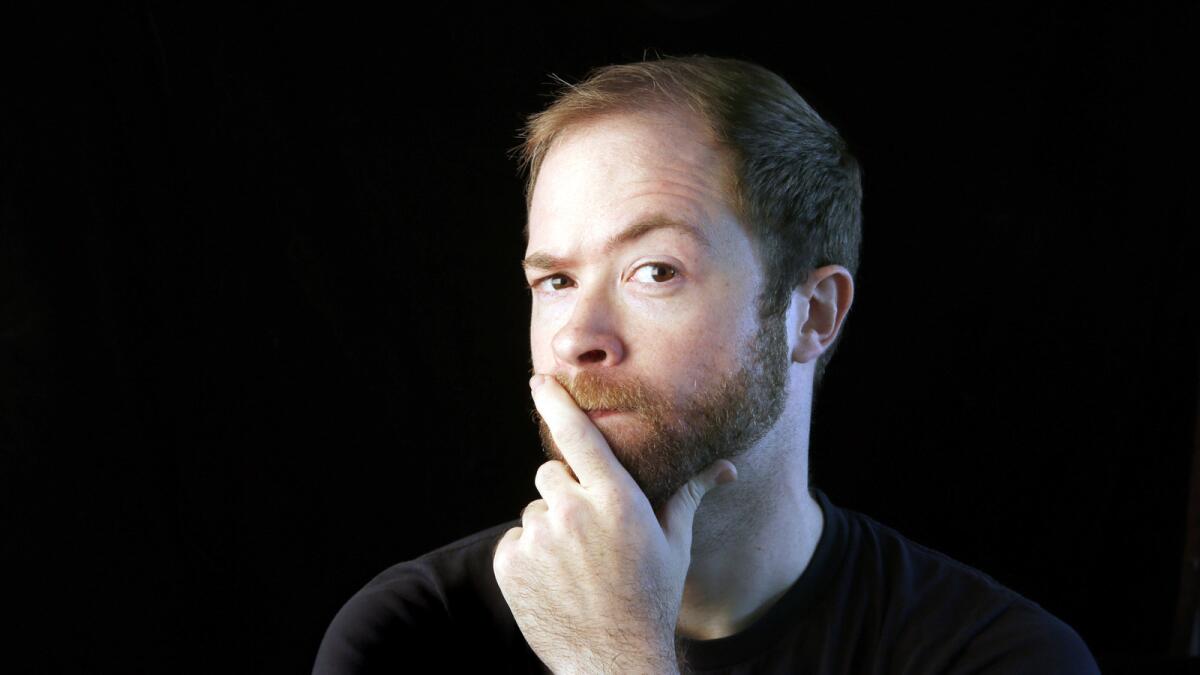VidCon moderator and YouTube star Mike Rugnetta on the Internet of ideas

“We wanted to mimic the experience of having your browser open with dozens of paths going and switching back and forth between them and having information wash over you,” Mike said.
- Share via
The seventh annual VidCon, which salutes, encourages and markets products to YouTubers and other makers of online video, is underway Thursday through Saturday at the Anaheim Convention Center. Originally created by Hank and John Green (“VlogBrothers”), the conference is testament to the energy and variety of Web-based programming — as reflected in this 2015 interview with PBS Idea Channel host (and VidCon moderator) Mike Rugnetta. As usual, the conference is sold out, but livestreams may be followed here.
I don’t recall the combination of links and clicks, of idleness and intention, that brought me to the door of Idea Channel, a YouTube channel under the aegis of PBS Digital Studios. But once I was in, I was in no hurry to leave.
I had that pleasantly confused sensation of “What is this thing?” that makes you want to stick around and find out — a question that, even with familiarity, is hard to settle. Though its form is fairly set — writer-host Mike Rugnetta, 31, faces the camera and talks — its interests are wide, and its juxtapositions can seem radical. Its stated theme, to examine “the connections between pop culture, technology and art,” doesn’t quite catch its wacky breadth.
Episodes have appeared weekly since the channel went live in February 2012, garnering more than 650,000 subscribers and nearly 45 million cumulative views. For a time, most began with the words “Here’s an idea.”
SIGN UP for the free Indie Focus movies newsletter >>
The proposition that followed would usually seem counterintuitive, off the wall or even dumb, the point being, as Rugnetta told me recently on the phone from his home in Brooklyn, to see “how when you take two things that don’t seem to play nice and put them next to one another, what kinds of things fall off in that collision.”
“An Idea Channel episode,” Rugnetta said, has to “combine something a good number of people will be familiar with, with something that is fun and interesting and can be put next to it in an unexpected way, and the relationship between those two things, you have to be able to boil it down into a sentence. And then it has to be something where, at the end of a 7-to-11-minute-long video, a large group of people will feel comfortable discussing it.”
It’s a temperamental cousin to Joe Hanson’s science-slanted “It’s Okay to Be Smart,” also produced by PBS Digital, and John and Hank Green’s ever-harder-to-categorize semi-diaristic, semi-educational vlogbrothers vlog: speedy, noisy, soulfully brainy rebukes by example (among many others) to the notion that digital culture is dominated by narcissists obsessed only by the minutiae of their own … minutiae.
Rugnetta looks out into a world of symbols and signs in which Theodor Adorno and Jean Baudrillard rub shoulders with “Rick and Morty,” selfies, unboxing videos, trigger warnings and “Too Many Cooks.” Subjects have included, “If There Are No Pics, Did It Happen?” “When Does Play Become Work?” “Are All Hotel Rooms the Same Place?” “Are There Internet Dialects?” “Is BMO From Adventure Time Expressive of Feminism?” “When Will We Worry About the Well-Being of Robots?” “Can Dungeons & Dragons Make You a Confident and Successful Person?” “How Do We and the Sims Perform Gender?” and “Is Google Knowledge?”
------------
FOR THE RECORD:
Mike Rugnetta: In the Oct. 18 Calendar section, an article about Idea Channel writer-host Mike Rugnetta gave the title of one of his videos as “Is BEMO From Adventure Time Expressive of Feminism?” The title is “Is BMO From Adventure Time Expressive of Feminism?” In addition, the article referred to vlogger Hank Green as Henry Green.
------------
These are not lectures so much as debates in which Rugnetta takes several sides, roping in dead philosophers and living bloggers for perspective before turning the matter over to his viewers for comment. (As commentators, they tend to be informed, civil and passionate; Rugnetta’s imagined ideal viewer is “someone who’s really smart and really invested and really loves the thing I’m talking about but they disagree with me.”)
It’s standard online practice to finish a post by asking viewers and readers to “tell us what you think,” but discussion is central to Idea Channel, which makes the comments section (which Rugnetta calls “the Doobly-Do,” I don’t know why) part of the playing field; every episode is followed by a “Comments Response” video in which Rugnetta comments on the comments.
The comments are important “because, in the event that I don’t manage to properly contextualize all of those theories or subjectivities or readings, it gives me an opportunity to say, ‘Oh, man, I completely missed out on this point of view.’”
Rugnetta, a Massachusetts native, moved to New York after graduating from Vermont’s Bennington College with a degree in music, composition and computer science. (He also hosts a fascinating podcast on the Infinite Guest network, “Reasonably Sound,” that deals with all manner of sonic phenomena, natural and man-made.) He worked in galleries, ran sound in clubs, had “a day job fixing computers for famous people; I helped design a studio for 50 Cent.”
Meanwhile, he wrote music for theater and dance pieces and, as What We Know So Far and MemeFactory, made performance art with a pair of Bennington classmates, Patrick Davison and Stephen Bruckert — “fast-paced, lecture-based performances inspired by the Internet and technology and the way the culture was changing, or the way we thought it was changing, in response to the Internet.
“We wanted to mimic the experience of having your browser open with dozens of paths going and switching back and forth between them and having information wash over you,” he said. “We wanted to make something where you wouldn’t get 100% of what we were saying or what was happening because it was moving so quickly and there were so many things happening at once, but that we would trust that somewhere in your brain you would get something.”
Idea Channel is very much an extension of what Rugnetta did there. “My background is in music composition and computer science and performance art. And so I come very much from a place of ‘We’re going to learn this together.’ I always say that the final product for an Idea Channel episode is not the video that we upload, but it’s the conversation that happens 300 pixels below it [in the comments section] because that’s what I’m trying really hard to make sure happens, that people can have a worthwhile discussion with their peers about this thing and that; the video is what gets it going.”
But apart from its actual content, Idea Channel has an invigorating, roller-coaster rush to it. Though Rugnetta’s disquisitions would also work on the page, they are performances as much as they are prose: exuberant, literally embodied. Their pacing is musical; they have an air of mischief. Rugnetta talks fast, while at his shoulder a stream of superimposed images, lifted from TV and cartoons and the deep well of the Web, provide a kind of punning, elucidating, rapid-fire running commentary.
“I just have to trust myself that the right balance of information and entertainment will come through,” Rugnetta said. “It’s like your really cool teachers in high school — they were cool because they were just kind of thrilled to be there and liked interacting with their students. I also don’t shy away from a good bad joke.”
In the modern way, he is concerned with inclusiveness and sensitivity, though hopefully not at the expense of argument. A lot of what goes into the series, he said, “is me trying to be really clear about where my biases lie, and how to be clear when I am describing a way one might see something as opposed to the way I see something, or an idea someone who is an actual authority has versus a sort of hunch I have in such a way that the people who don’t have those ideas still feel acknowledged in the video.”
“Do you know what the Dunning-Kruger Effect is?” Rugnetta asked, referring to a 1999 Cornell University study that found ignorance of one’s limitations confers confidence while awareness of them is inhibiting. “Idea Channel is to a certain degree me attempting to stay in the first part of the Dunning-Kruger Effect, not being worried that I don’t know everything, because it’s the moment I realize I have no idea what I’m talking about that I become paralyzed: ‘No, can’t talk about that, because I just shouldn’t, and it would be bad.’
“No matter how often and how clearly you state that you do not have and do not want authority and that the audience is actually doing itself a disservice by giving you authority, if you are a media entity of any kind, the audience will still give you authority.”
He has suggested to his viewers that “it may actually be in your best interest to not automatically trust the media you view but to automatically distrust it. From the beginning I’ve said, ‘I’m not saying this is how you should think.’ It’s raising questions to see what happens when we raise them, but it’s not necessarily that we’re getting to an answer.”
ALSO:
VidCon, the annual video star convention, has gotten so big it’s expanding globally
As VidCon gets underway, science presenters rule the Web
Facebook a bigger player at this year’s VidCon
More to Read
The complete guide to home viewing
Get Screen Gab for everything about the TV shows and streaming movies everyone’s talking about.
You may occasionally receive promotional content from the Los Angeles Times.







